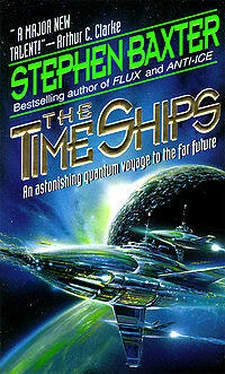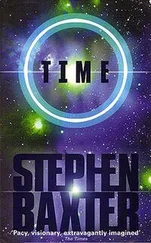“Bomb History?”
“Think of it — one might go back and intervene in the early stages of the War. Or assassinate Bismarck — why not? — what a prank that would be — and put a stop to the formation of Germany in the first place.
“Can you see it, sir? A Time Machine is a weapon against which there can be no defense. Whoever first develops a reliable Chronic-Displacement technology will be the Master of the World — and that Master must be Britain!”
His eyes shone, and I began to find his high-altitude enthusiasm for all of this destruction and power rather disturbing.
[8]
The uplands of the Future
We reached the Lancaster Walk and began our stroll back to the southern boundary of the park. We were still flanked by our discreet soldiers.
I said, “Tell me more of what will be done when Britain and her Allies win this Time War — tell me about your ’Uplands of the Future.’ “
He rubbed his nose and looked uncertain. “I’m no politician, sir. I can’t.”
“No, no. Give me your own words.”
“Very well.” He looked up at the Dome. “To begin with — this War has stripped away a lot of our fond illusions, you know.”
“It has?” I thought that an ominous preamble — and my fears were soon justified!
“The Fallacy of Democracy, for one thing. You see, it is now clear that is no good asking people what they want. You have first to think out what they ought to want if society is to be saved. Then you have to tell them what they want and see that they get it.
“I know this may seem odd for a man of your century,” he said, “but it’s the modern thinking — and I’ve heard your famous friend espouse much the same views on the phonograph before! — and he’s of your time, isn’t he?
“I know little of History, but it seems to me that the Modern State which we’re developing in Britain and America the form of things we intend to share with the rest of the world — is more like the Republics of antiquity — Carthage, Athens, Rome — which were essentially aristocratic, you see. We have Members of Parliament still, but they are no longer nominated by anything so crude as popular suffrage.
“And all that old business of Opposition — well! We’ve given all of that up. Look, men like you and me know that about most affairs there can be no two respectable and opposed opinions. There is one sole right way and endless wrong ways of doing things. A government is trying to go the right way, or it is criminal. That is all there is to it. The Opposition of the past was mostly just a spoiling job done for advancement. And the sabotage must cease.
“And some of the younger folk are going much further, in their thinking on the future. The family, for instance, is dissolving — so they say. It was the common social cell, if you like, through all our agricultural past. But now, in our modern world, the family is losing its distinctness, and has been dissolving into larger systems of relationships. The domestication of all our young people, including the women, is diminishing greatly.”
I thought, at that, of Captain Hilary Bond. “But what’s to replace the family?”
“Well, the outlines aren’t clear, but the youngsters are talking of a re-nucleation of society around different seeds: teachers, writers, talkers, who will lead us into a new way of thinking — and get us away from this old tribalism and into a better way.”
“ ’Uplands,’ indeed.” I doubted that much — or any! — of this philosophizing originated with Wallis himself; he was acting simply as a mirror of his times, as molded by the chattering opinion-makers in Government and beyond. “And how do you feel about all this?”
“Me?” He laughed, self-deprecating. “Oh, I’m too old to change — and,” his voice was uneven, “I’d hate to lose my daughters… But, likewise, I don’t want to see them growing up in a world like” — he waved a hand at the Dome, the dead Park, the soldiers — “like this! And if that means changing the heart of man, then so be it.
“Now,” he said, “can you see why we need your cooperation? With such a weapon as a CDV — a Time Machine — the establishment of this Modern State becomes, not trivial, but more achievable. And if we fail—”
“Yes?”
He stopped; we were approaching the south wall of the Park now, and there were few people around. He said in a low voice, “We have rumors that the Germans are building a Time Machine of their own. And if they succeed first — if the Reich gets functioning Chronic-Displacement Warfare capabilities…”
“Yes—”
And he painted, for my benefit, a brief but chilling portrait, evidently informed by years of propaganda, of the Time War to come. The old Kaiser’s cold-eyed staff officers would be planning how to project into our noble History their half-doped, crazy lads — their Time Warriors. Wallis portrayed these soldiers as if they were bombs with legs; they would swarm forward into a hundred of our ancient battles like death-dealing dolls…
“They would destroy England — strangle it in its cot. And that’s what we have to stop,” he said to me. “You see that, don’t you? You see it?”
I gazed into his deep, earnest face, quite unable to respond.
Wallis returned me to the house in Queen’s Gate Terrace. “I don’t want to press you for a decision on working with me, old man — I know how difficult all this must be for you; after all, it isn’t your War — but time is short. And yet, what does ’time’ mean, in such a circumstance? Eh?”
I rejoined my companions in the smoking-room. I accepted a whisky-and-water from Filby and threw myself into a chair. “It’s so close out there,” I said. “More like Burma! — that damned Dome. And doesn’t it feel odd? Pitch dark outside, and yet it’s only lunch-time.”
Moses glanced up from the volume he was reading. “ ’Experience is as to intensity and not as to duration,’ “ he quoted. He grinned at me. “Wouldn’t that be a perfect epitaph for a Time Traveler? Intensity — that’s what counts.”
“Who’s the author?”
“Thomas Hardy. Close to a contemporary of yours, wasn’t he?”
“I’ve not read him.”
Moses checked the preface. “Well, he’s gone now… 1928.” He closed the book. “What did you learn from Wallis?”
I summarized my conversations for them. I concluded, “I was glad to get away from him. What a farrago of propaganda and half-baked politics… not to mention the most perfect muddle about causality, and so forth.”
Wallis’s words had deepened the sense of depression I had endured since my arrival here in 1938. It seems to me that there is a fundamental conflict in the heart of man. He is swept along by the forces of his own nature — more than anyone, I have witnessed the remorseless action of the evolutionary currents which pulse through Humanity, deriving even from the primal seas — and yet here were these bright young Britons and Americans, hardened by War, determined to Plan, to Control, to fight against Nature and set themselves and their fellows in a sort of stasis, a frozen Utopia!
If I were a citizen of this new Modern State they intended, I knew, I should soon have become one of the protesting spirits who squirmed in its pitilessly benevolent grip.
But, even as I reflected thus, I wondered, deep in my heart, to what extent I would have fallen into Wallis’s way of thinking — of this Modern State, with its Controls and Plans — before my time-traveling had opened up my eyes to the limitations of Humanity.
“By the way, Nebogipfel,” I said, “I came across an old friend of ours — Kurt Gödel—”
Читать дальше
Конец ознакомительного отрывка
Купить книгу









